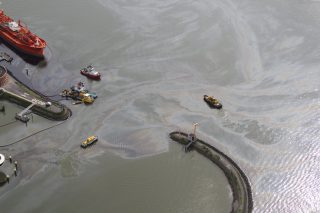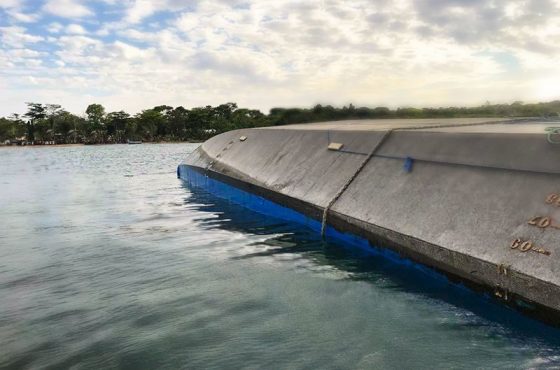Port of Rotterdam: Bow Jubail Oil Spill Clean-Up Will Last until Mid-2019
The cleanup operation of the heavy-fuel oil that spilled from Odfjell’s chemical tanker Bow Jubail at the end of June is expected to last until the middle of 2019, according to the Port of Rotterdam Authority.
The tanker vessel leaked over 200 tonnes of fuel oil in the port of Rotterdam following the collision that took place on June 23.
The port authority said on Thursday it would replace a section of the slopes stretching over more than 9 kilometers that had been contaminated by the Bow Jubail oil spill. As disclosed, the decision on the slope removal has been made due to the inability to clean the slopes with hot water as majority of volatile component from the fuel oil had evaporated by now. Therefore, the removal has been identified as a cheaper option than cleaning.
As for the rest of the port infrastructure, quay walls, jetties, buoys and poles can in general be cleaned, as these surfaces can be sprayed with cleaning agents directly under high pressure, the port authority added.
The Port of Rotterdam has almost 75 kilometres of quay wall and more than 200 kilometres of slopes.
“At the moment, cleaning is still focused on those sections of the port infrastructure that have not yet been cleaned as they did not restrict shipping from and to the terminals concerned,” the release reads.
The last restrictions on shipping caused by the water pollution were lifted a month ago.
The Port Authority announced earlier that the damage resulting from the oil spill is estimated at around EUR 80 million. The port plans to recover this damage from Odfjell, the owner of Bow Jubail.
“We will do everything in our power to recover these damages. Society here cannot be left to pay for this,” the port authority’s Chief Operations Officer (COO) Ronald Paul says.
Speaking to World Maritime News, Harald Fotland, Odfjell SE’s COO, expressed deep regret for the incident and its impact on local industry and environment.
“This is a complex and substantial legal matter with many stakeholders, and the judicial positioning by the Port of Rotterdam is not unusual in proceedings such as this. We deeply regret the damage inflicted on innocent third parties, and will compensate for documented losses up to the maximum legal liability. The coverage of claims following the incident will be in full accordance with Dutch law and regulation, and governed by international conventions,” he said.
Following the collision, the ship was moved to the Port of Rotterdam where it was repaired. Based on its latest AIS information, the vessel resumed operation and is currently moored in Houston, Texas.
Source: worldmaritimenews.com



